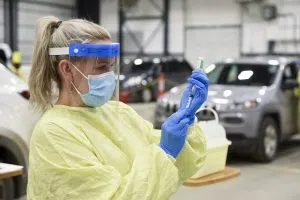
A nurse prepares a vaccine for an attendee of the drive-thru clinic in Regina. (Photo: Saskatchewan Health Authority)
One of the biggest challenges many jurisdictions have faced when it comes to COVID-19 vaccines, is the spread of misinformation.
As Saskatchewan continues to see vaccine hesitancy, two University of Regina researchers have joined a panel hosting virtual town halls across the country, that are available in Saskatchewan this week, with the objective of ending misinformation surrounding COVID-19 vaccinations that in-turn creates vaccine hesitancy.
One of those researchers is Dr. Tanya Dahms, a Professor of Biochemistry, who said these sessions are not about telling you what choice to make, but rather providing you with the most accurate information available, so you can make the most informed decision possible.
“I’m not going to prescribe to you how you make the decision, Dahms said. “I’m just going to provide you with enough valid information before you make your own decision, so really it’s about informed consent, and it’s not intended to be a place where we try and dictate what’s going on.”
One of the most common misconceptions is that there is a possibility the mRNA vaccines from Pfizer-BioNTech and Moderna can alter DNA, and create negative effects that may not be seen or known for years.
Dr. Dahms said simply, that is not possible.
“So essentially it (vaccines) comes into your body, it serves as a code to make a protein, to which we have a positive immune response, and then it’s broken down and gone within about 30 minutes,” she said.
Dahms also wants people to know that it is impossible to spread the virus because of a vaccine you received.
The second virtual town hall will be held Thursday night at 8:00 p.m.
Members of the public can register for these Zoom-based sessions at Saskatchewan vaccine Q&A.
There is also a phone-in option available.
More from Dr. Tayna Dahms, Professor of Biochemistry:







